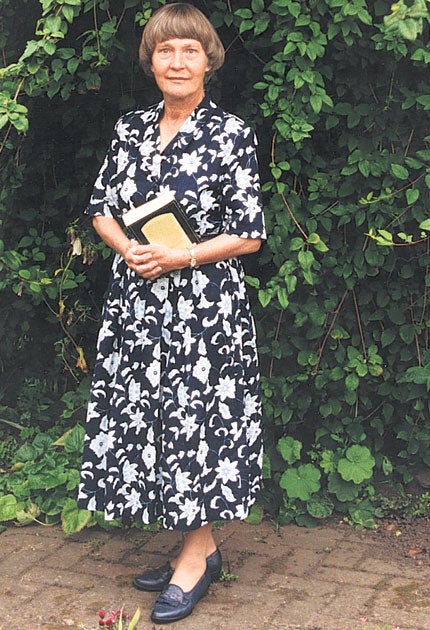Brenda Moon: University librarian who had a clear vision of the transformative effects of digitisation

Your support helps us to tell the story
From reproductive rights to climate change to Big Tech, The Independent is on the ground when the story is developing. Whether it's investigating the financials of Elon Musk's pro-Trump PAC or producing our latest documentary, 'The A Word', which shines a light on the American women fighting for reproductive rights, we know how important it is to parse out the facts from the messaging.
At such a critical moment in US history, we need reporters on the ground. Your donation allows us to keep sending journalists to speak to both sides of the story.
The Independent is trusted by Americans across the entire political spectrum. And unlike many other quality news outlets, we choose not to lock Americans out of our reporting and analysis with paywalls. We believe quality journalism should be available to everyone, paid for by those who can afford it.
Your support makes all the difference.In 1980 Brenda Elizabeth Moon was appointed chief librarian of the University of Edinburgh, so becoming the first woman to hold such a post in Scotland, and one of the first in a major UK research library.
In her 16 years in the role, she was a pioneer, bringing the library into the late 20th century, with a clear vision of the transformative influence digitisation would have on libraries.
But for Moon, libraries were above all about collections. At Edinburgh she re-invigorated the special collections, paving the way for the service the library now provides which incorporate many sorts of objects: books, manuscripts, archives, museum objects and art works. She brought major collections to Edinburgh University Library, including the papers of modern Scottish poets such as George Mackay Brown, Norman MacCaig and Hugh MacDiarmid, materials on WH Auden, the Arthur Koestler collection and the Corson-Sir Walter Scott collection.
Brenda Moon was born on 1931 in Newcastle-under-Lyme, educated in Birmingham, and went to St Hilda's College, Oxford to read Greats. She worked as a librarian in the university libraries of Sheffield, Hull and Edinburgh. In Hull, at the Brynmor Jones Library, she served under Philip Larkin, who wrote a poem "The daily things we do" which he laid on her desk in February 1979 on the occasion of the 50th anniversary of the library's opening. He had also written, at her behest, a poem about libraries, "New eyes each year", which was produced on the Hull handpress for the same occasion.
[Private poem]
The daily things we do
For money or for fun
Can disappear like dew
Or harden and live on.
Strange reciprocity:
The circumstance we cause
In time gives rise to us,
Becomes our memory.
[Public poem]
New eyes each year
Find old books here,
And new books, too,
Old eyes renew;
So youth and age
Like ink and page
In this house join,
Minting new coin.
Moon had a very personal style, and she wanted to provide the best possible library service to a wide range of users. Tam Dalyell, the former Rector of the University of Edinburgh, confirmed how valuable was her contribution to all staff, researchers and students who asked for her help.
Brenda cared for her library staff – they were her family, and many remember with affection the interest she showed in their careers and private lives. At meetings with her, there was always a treat to make the decision-making easier – scones and lemon cakes stand out in my memory; Moon needed little sleep, and baked early in the morning.
Moon was an active member of several library organisations, both Scottish and international, and was a co-founder of CURL (Consortium of University Research Libraries, now RLUK), set up to address the specific issues of larger research libraries. In these organisations she participated fully, helping to turn them from what could have been gentlemen's dining clubs into meaningful professional organisations. She was elected a Fellow of the Royal Society of Edinburgh (RSE), and subsequently became the curator of the RSE from 2002-2005.
Moon was also an author, specialising in woman travellers. She gained her MPhil in 1987 from Leeds University with a thesis on Marianne North, and later her PhD from the University of Hull on Amelia Edwards. This was subsequently published as More Usefully Employed: Amelia B Edwards, writer, traveller, and campaigner for Ancient Egypt (2006).
Like these women, Brenda Moon was a great traveller, often to European countries, largely driven by her interest in botany, and she became an accomplished photographer of flowers. She was very generous as a hostess, and I spent many evenings in her house, or her delightful garden, seeing photographs of her most recent trip. In retirement, she travelled widely with her very dear sister, Mary. After the recent diagnosis of a brain tumour, Mary spent all her time with Brenda, reading poetry to her and talking of their lives and travels together.
Brenda Elizabeth Moon, librarian: born Newcastle-under-Lyme 11 April 1931; Librarian to the University of Edinburgh 1980-1996; died Edinburgh 7 March 2011.
Join our commenting forum
Join thought-provoking conversations, follow other Independent readers and see their replies
Comments